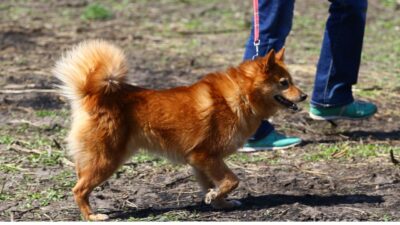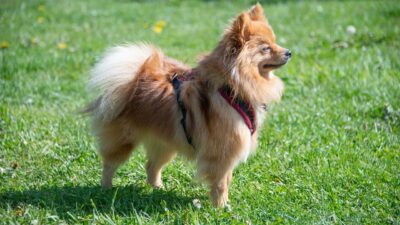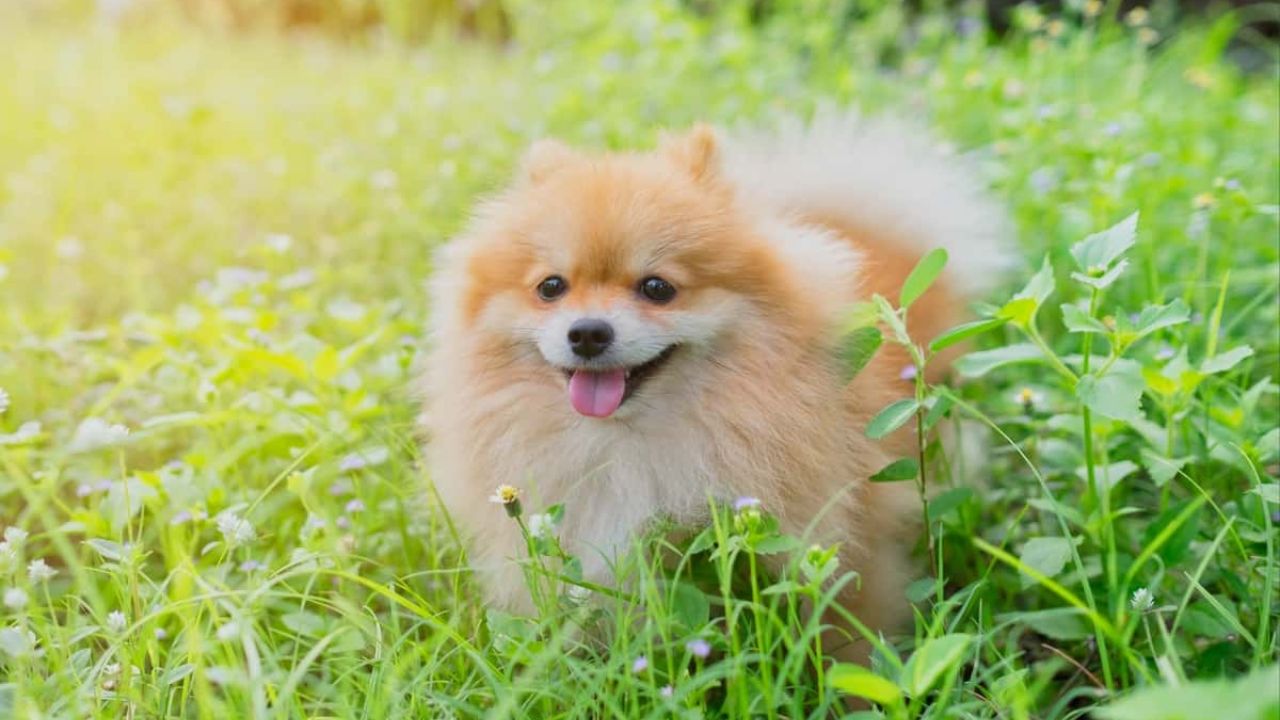How long does it take to train a Pomeranian puppy? Pomeranian puppies are renowned for their adorable appearance and lively demeanor, making them a beloved choice for many dog lovers. However, like all breeds, Pomeranians require proper training to become well-behaved companions. If you’re considering bringing home a Pomeranian puppy, how long does training take?
Knowledge About How Long Does it Take to Train a Pomeranian Puppy
Training a Pomeranian puppy requires time, patience, and understanding. On average, training a Pomeranian puppy effectively takes a few weeks to several months. The length of time varies based on the puppy’s age, temperament, and consistency of training. Because Pomeranians are clever but obstinate, they must practice patience and positive reinforcement. Establishing basic obedience skills like housebreaking and command teaching usually takes a few weeks. Nonetheless, continuous behavior and socialization training might last a few months to guarantee a well-mannered and well-adjusted friend. Owners can foster a close relationship with their Pomeranian puppy and assist in their development into self-assured and obedient dogs by devoting time and energy to training.

Temperament and Behavior
Training a Pomeranian puppy hinges on understanding its temperament and behavior. Because of its intelligence and occasional stubbornness, training a Pomeranian correctly usually takes weeks to months. Pomeranians’ playful, alert, and often independent temperament influences training approaches. It’s crucial to use consistency, patience, and positive reinforcement techniques. Their Socialization ensures their comfort in a range of settings. Owners who put in the work can raise a polite companion and establish a secure relationship.
Training Needs of How Long Does it Take to Train a Pomeranian Puppy
Training a Pomeranian puppy requires understanding their unique needs, which can impact the duration of the training process. On average, training a Pomeranian effectively takes several weeks to months. These fluffy companions are intelligent but stubborn, necessitating patience and consistency in training. Socialization favors their behavior since it gives them a sense of competence in various situations. Establishing fundamental obedience abilities, including housebreaking and command teaching, often takes several weeks. Owners can enhance their bond with their Pomeranians and assist them in developing into well-mannered companions by adhering to their specific training requirements and creating a routine.
Puppy Socialization
Pomeranian puppy socialization is crucial for their development and impacts training duration. Generally, it takes several weeks to months to train a Pomeranian effectively. Socialization ensures they feel comfortable in different environments, reducing behavioral problems. Exposing puppies to various stimuli, such as people, animals, and settings, helps build confidence and adaptability. Positive experiences and training foster a well-rounded Pomeranian companion, enhancing their social skills and overall behavior.
Basic Obedience Training
Training a Pomeranian puppy in basic obedience typically takes weeks to months for effective results. Due to their intelligence and occasional stubbornness, patience and consistency are key. Positive reinforcement approaches should be used to teach fundamental obedience cues like come, sit, and stay. It’s crucial to have regular training sessions catered to the puppy’s attention span. By devoting time and energy to fundamental obedience training, owners can raise a well-mannered and obedient Pomeranian companion.
Housebreaking
Housebreaking a Pomeranian puppy typically takes several weeks to months of successful training. Consistency, patience, and positive reinforcement are crucial during this process. Establishing a regular schedule for feeding and bathroom breaks helps reinforce desired behaviors. Supervision is key to preventing accidents indoors, and praising the puppy when they eliminate them outside reinforces the training. Owners can establish good habits early on by investing time and effort into housebreaking and enjoying a clean and well-trained Pomeranian companion.

Factors Affecting Training Time For How long does it take to train a Pomeranian puppy
Training a Pomeranian puppy can vary in duration due to several factors. The puppy’s age, temperament, and the owner’s commitment all influence the training timeline. Pomeranians are intelligent but can also be stubborn, which may prolong the training process. Training approaches and positive reinforcement strategies must consistently achieve the desired effects. The training setting and socialization opportunities help the puppy learn and grow. A Pomeranian needs weeks or months to learn new skills. However, owners may teach their furry companions to be obedient and well-mannered family members with enough dedication and effort.
Puppy’s Age
The age of a Pomeranian puppy significantly impacts training duration. Generally, younger puppies require more time and patience as they learn basic commands and behaviors. Their attention spans are shorter, necessitating shorter training sessions. Older puppies may grasp concepts more quickly but may have established behaviors that must be corrected. Owners can assist their Pomeranian puppies in growing up to be well-mannered companions by providing them with regular training and encouragement.
Consistency in Training
Consistency in training is paramount when teaching a Pomeranian puppy. Regular, structured sessions reinforce desired behaviors and establish routines. Pomeranians thrive on consistency, responding positively to familiar cues and commands. Inconsistent training can confuse puppies and hinder progress. By maintaining a steady training schedule and consistent methods, owners can effectively train their Pomeranian puppies and ensure they develop into well-behaved companions.
Owner’s Experience
The owner’s experience plays a crucial role in training a Pomeranian puppy. Experienced owners often understand effective training techniques and can communicate with their puppies more efficiently. They may recognize subtle cues and adjust their approach accordingly, potentially shortening the training duration. However, inexperienced owners can still successfully train Pomeranian puppies with patience, consistency, and guidance from reputable resources or professional trainers. A positive and supportive environment ultimately fosters successful training outcomes for experienced and novice owners.
Training Timeline for How Long Does it Take to Train a Pomeranian Puppy
Training a Pomeranian puppy requires patience, dedication, and understanding of their unique characteristics. The training timeline for Pomeranian puppies varies based on age, temperament, and the owner’s commitment. Basic obedience training, including housebreaking and teaching commands, typically takes several weeks to establish. Socialization is crucial during the early months to ensure their comfort in various environments. Training methods must be consistent, as must positive reinforcement strategies for learning to be effective. Certain puppies may pick things up fast, while others may need more time and practice. Owners who put in persistent work and care can raise well-mannered Pomeranian companions over several weeks to months, creating a lasting and peaceful relationship that will last for years.
Early Socialization (6–12 weeks)
Early Socialization is crucial for Pomeranian puppies aged 6 to 12 weeks. Exposing them to different people, animals, and environments during this critical period helps shape their behavior positively. Socialization builds confidence, reduces fearfulness, and prevents future behavioral issues. Consistent positive experiences during this time lay the foundation for a well-adjusted and friendly adult Pomeranian. Owners should prioritize early Socialization to ensure their puppy grows into a confident and friendly companion.
Basic Commands (3-6 months)
Training Pomeranian puppies in basic commands, typically between 3 and 6 months, sets a solid foundation for obedience. During this critical phase, consistency and positive reinforcement are essential. Establishing communication and reinforcing desired actions are benefits of teaching commands such as sit, remain, and come. Owners can effectively teach their Pomeranian puppies basic commands with patience and consistent repetition, which will pave the road for more training and a harmonious connection.
Refinement and Advanced Training (6+ months)
Refinement and advanced training for Pomeranian puppies, typically starting at 6 months, build upon foundational skills. Continued consistency and positive reinforcement are essential during this stage. Advanced commands like heel, leave it, and tricks require patience and practice. Training sessions should remain engaging and rewarding to maintain the puppy’s interest. With dedication and ongoing training, owners can further enhance their Pomeranian’s skills and behavior, fostering a strong bond and a well-trained companion for years.

Tips for Efficient Training How Long Does it Take to Train a Pomeranian Puppy
Efficient training of a Pomeranian puppy relies on several key tips. Firstly, establish a consistent routine and stick to it, as Pomeranians thrive on predictability. Treats and praise are examples of positive reinforcement strategies that can be used to encourage and recognize desired behavior. Keep training sessions brief and interesting to keep the puppy focused and from getting bored. To ensure your puppy is at ease in various settings, socialize them early and often. Finally, remember that training requires time and practice, so be patient and persistent. Using these pointers, owners may effectively train their Pomeranian puppies, creating a solid bond and raising a well-mannered friend for many years.
Positive Reinforcement
Positive reinforcement is key to effectively training a Pomeranian puppy. Rewards like treats, praise, and playtime encourage desired behaviors, making learning enjoyable for the puppy. Timing and consistency are key; rewards should be given immediately to reinforce the desired behavior. By emphasizing positive reinforcement, owners can quickly accomplish good training results and create a deep attachment with their Pomeranian puppy.
Short, Regular Sessions
Short, regular training sessions are ideal for Pomeranian puppies. Their short attention spans benefit from brief, focused sessions multiple times daily. Aim for 5–10 minutes per session to keep the puppy engaged and prevent boredom. Consistency is key; daily training reinforces learning and helps establish good habits. You can effectively train your Pomeranian puppy over time by incorporating short, regular training sessions into your routine.
Patience and Persistence
It takes perseverance and patience to train a Pomeranian puppy. Since each puppy learns differently, it’s critical to be patient and consistent with them throughout the process. It takes persistence to keep going when things appear to be moving slowly. Owners can successfully teach their Pomeranian puppy desirable habits and build a strong bond based on mutual trust and understanding by approaching training with patience and determination.
Common Training Challenges for How long does it take to train a Pomeranian puppy
Training a Pomeranian puppy comes with its share of common challenges. One such challenge is their stubbornness, which requires patience and consistency in training. Another is their small size, making it easy for them to become overwhelmed in new environments. Additionally, Pomeranians can be prone to barking excessively, requiring special attention during training. Socialization can also pose a challenge, as they may need to be made aware of unfamiliar people or animals. By addressing these common challenges with positive reinforcement techniques and consistent training, owners can overcome obstacles and successfully train their Pomeranian puppy, fostering a happy and well-behaved companion.
Housebreaking Issues
Housebreaking issues can be common when training a Pomeranian puppy. Due to their small size and sometimes stubborn nature, accidents indoors may occur. Consistency, patience, and positive reinforcement are key in addressing these issues. Housebreaking a Pomeranian puppy can be accomplished gradually by creating a routine for toilet breaks and rewarding good behavior.
Barking and Vocalization
Barking and vocalization can present challenges when training a Pomeranian puppy. Their propensity to bark at strange stimuli and their vigilant temperament can cause them to vocalize excessively. This habit can be reduced with positive reward strategies and consistent training. Barking habits can be curbed, leading to a more peaceful and calm household environment, by teaching the “quiet” command and offering mental and physical activity.
Conclusion
Training a Pomeranian puppy requires patience, consistency, and a deep understanding of their unique characteristics. Owners can nurture well-behaved and happy companions by employing positive reinforcement techniques and addressing their needs.
FAQs
How Much Time Does it Take to Train a Pomeranian Puppy?
The length of the training depends on the puppy’s age, temperament, and consistency. Basic obedience training may take several weeks to many months to achieve the desired outcomes.
What are Some Common Training Challenges When Training a Pomeranian Puppy?
Common challenges include their stubbornness, small size leading to potential overwhelm, tendency to bark excessively, and socialization issues.
What Training Methods Work Best for Pomeranian Puppies?
Treats and praise are two very powerful forms of positive reinforcement for Pomeranians. Positive outcomes can be achieved with patience, consistency, and brief, regular training sessions.
When Should I Begin Training My Dog? Who is a Pomeranian?
Training can begin as early as eight weeks if a puppy is willing to learn. However, Socialization should start even earlier—ideally, when the child is three to twelve weeks old.
Is Professional Training Necessary for Pomeranian Puppies?
While professional training can benefit many owners, successfully training their Pomeranian Socialization with consistent effort and positive reinforcement. However, professional guidance may be useful for addressing specific behavioral issues.

